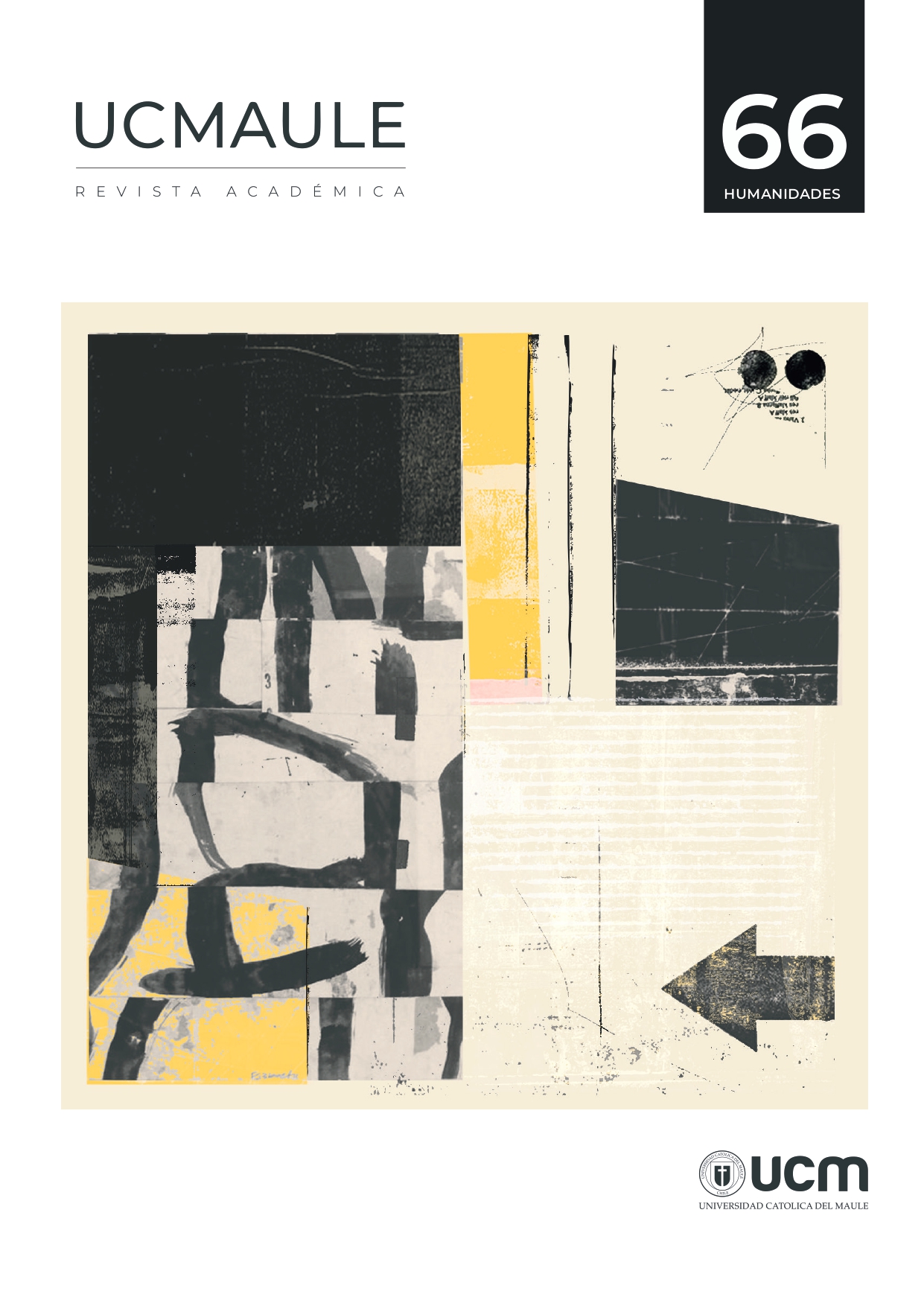Significados que atribuyen los estudiantes universitarios al efecto de binge-watching en sus patrones de desempeño ocupacional
Contenido principal del artículo
Resumen
Detalles del artículo
Albertos, A. e Ibabe, I. (2021). Uso problemático de las tecnologías, actividades de ocio y funciones ejecutivas en adolescentes. Revista de Educación, (394). https://recyt.fecyt.es/index.php/Redu/article/view/90195
Agencia Digital Jelly (5 de enero, 2021). Streaming en Chile: La batalla que viene. https://www.jelly.cl/streaming-en-chile-la-batalla-que-viene/
Ahmed, A. (2017). A New Era of TV-Watching Behavior: Binge-watching and its Psychological Effects. Media Watch, 8(2). https://doi.org/10.15655/mw/2017/v8i2/49006
American Occupational Therapy Asociation (AOTA) [Asociación Americana de Terapia Ocupacional] (2020). Marco de trabajo para la Práctica de Terapia Ocupacional: Dominio y Proceso. https://es.slideshare.net/FRANCYMIRLEY/aota-2020-espaol-revisada-y-corregida
Beggs, B. y Elkins, D. (2010). La influencia del ocio motivación sobre la satisfacción del ocio. Revista Cibernética de Investigación Aplicada sobre Ocio y Recreación. http://larnet.org/2010-02.html
Belén, A. (2021). El binge-watching y las adicciones comportamentales: Análisis desde una perspectiva teórica. https://hdl.handle.net/20.500.12590/16576
Bernard, H. (2006). Research Methods in Anthropology: Qualitative and Quantitative Approaches. AltaMira Press.
Biblioteca del Congreso Nacional de Chile [BCN] (s/f). Ley 20.120 (22-sep-2006), Sobre la investigación científica en el ser humano, su genoma, y prohíbe la clonación humana. Ley Chile. Biblioteca del Congreso Nacional de Chile. https://bcn.cl/2fe0y
Camacho, J. (2021). El teletrabajo, la utilidad digital por la pandemia del COVID-19. Revista Latinoamericana de Derecho Social, (32), 125-155. https://doi.org/10.22201/iij.24487899e.2021.32.15312
Casana, S. (2019). Riesgo de adicción al internet en estudiantes del 4to y 5to grado de secundaria de la Institución Educativa Santo Domingo de Guzmán del distrito de Tauca Ancash-2019. Ucv.edu.pe. https://hdl.handle.net/20.500.12692/39456
Castillo, M. (2021). Cambios en el comportamiento de consumo de plataformas de streaming durante una pandemia. Diario Delfino. https://delfino.cr/2021/09/cambios-en-el-comportamiento-de-consumo-de-plataformas-de-streaming-durante-una-pandemia
Cedeño García, G. C. y Pazmiño Remache, C. G. (2021). Tesis. Recuperado a partir de http://repositorio.ug.edu.ec/handle/redug/54545
Cáceres, P. (2003). Análisis cualitativo de contenido: Una alternativa metodológica alcanzable.Psicoperspectiva, II(1), 53-81. https://www.redalyc.org/articulo.oa?id=171018074008
Chang, Y. J. y Peng, C. Y. (2022). Exploring experiences of binge-watching and perceived addictiveness among binge-watchers: a qualitative study. BMC Public Health, 22, 2285. https://doi.org/10.1186/s12889-022-14789-z
Cornelio-Marí, E. M. (2023). La práctica del binge-watching entre estudiantes universitarios mexicanos. Cuadernos.Info, (54), 205-224. https://doi.org/10.7764/cdi.54.52353
Dandamudi, V. y Sathiyaseelan, A. (2018). Binge-watching: ¿why are college students glued to their screens? Journal of Indian Health psychology, 12, 41-52.
Espín Álvarez, E. y Freire Muñoz, I. (2019). Relación entre el uso de internet para el entretenimiento y el aprendizaje escolar en estudiantes adolescentes del Ecuador. CienciAmérica: Revista de divulgación científica de la Universidad Tecnológica Indoamérica,8(1), 138-157. https://dialnet.unirioja.es/servlet/articulo?codigo=6999126
Flayelle, M., Maurage, P. y Billieux, J. (2017). Toward a qualitative understanding of binge-watching behaviors: A focus group approach. Journal Of Behavioral Addictions, 6(4), 457-471. https://doi.org/10.1556/2006.6.2017.060
Fuster, D. (2019). Investigación cualitativa: Método fenomenológico hermenéutico. Propósitos y Representaciones, 7(1), 201-229. http://dx.doi.org/10.20511/pyr2019.v7n1.267
Hernández Sampieri, R., Fernández, C. y Baptista Lucio, P. (2014). Metodología de la investigación (6a. ed). McGraw-Hill.
Huckins, J., DaSilva, A., Wang, W., Hedlund, E., Rogers, C., Nepal, S. y Campbell, A. (2020). Mental health and behavior during the early phases of the COVID-19 pandemic: a longitudinal mobile smartphone and ecological momentary assessment study in college students. Journal of Medical Internet Research, 22(6), e20185.
Kofi, D. y Oduro-Appiah, G. (2022). Effects of binge-watching of Netflix on students: A study of department of theatre and film studies, University of Cape Coast, Ghana. Journal of African History Culture and Arts, 2(4), 225-233. https://doi.org/10.57040/jahca.v2i4.289
Kerlinger, F. (2002). Investigación del comportamiento: técnicas y comportamiento (4ª ed.). Editorial Interamericana.
Martín-Crespo, C. y Salamanca, A. (2007). El muestreo en la investigación cualitativa. NURE investigación. Revista Científica de la Sociedad Española de Enfermería Neurológica, (27). https://dialnet.unirioja.es/metricas/documentos/ARTREV/7779030
Martínez-Salgado, C. (2012). El muestreo en investigación cualitativa: principios básicos y algunas controversias. Ciência & Saúde Coletiva, 17(3), 61-619. https://doi.org/10.1590/S1413-81232012000300006
Ortega, J. (2020). ¿Cómo saturamos los datos? Una propuesta analítica desde y para la investigación cualitativa. Interciencia, 6, 293-299. https://www.redalyc.org/journal/339/33963459007/html/
Otzen, T. y Manterola, C. (2017). Técnicas de Muestreo sobre una Población a Estudio. Revista Internacional de Morfología, 35(1), 227-232.https://doi.org/10.4067/s0717-95022017000100037
Pérez, J. y Diaz, M. (2017). Nuevos modelos de consumo audiovisual: los efectos del binge-watching sobre los jóvenes universitarios. adComunica. Revista Científica de Estrategias, Tendencias e Innovación en Comunicación, 13, 201-221. https://doi.org/10.6035/2174-0992.2017.13.11
Pierce-Grove, R. (2016). Just one more: How journalists frame binge-watching. First Monday, 22(1). https://doi.org/10.5210/fm.v22i1.7269
Ramírez-Vizcaya, S. y Froese, T. (2019). The Enactive Approach to Habits: New Concepts for the Cognitive Science of Bad Habits and Addiction. Front. Psychol, 10. https://doi.org/10.3389/fpsyg.2019.00301
Reyes, D. (2018). Efectos adversos de las nuevas tecnologías y su interferencia en el proceso de aprendizaje. Educación, 24(2), 217-226. https://doi.org/10.33539/educacion.2018.v24n2.1341
Ruiz, J. (2012). Metodología de la investigación cualitativa (5a ed.). Universidad de Deusto.
Starosta, J., Izydorczyk, B. y Dobrowolska, M. (2020). Personality Traits and Motivation as Factors Associated with Symptoms of Problematic Binge-Watching. Sustainability, 12(14). http://dx.doi.org/10.3390/su12145810
Starosta, J. A. e Izydorczyk, B. (2020). Understanding the phenomenon of binge-watching—a systematic review. International Journal of Environmental Research and Public Health, 17(12). https://doi.org/10.3390/ijerph17124469
Steiner, E. y Xu, K. (2018). Binge-watching motivates change: Uses and gratifications of streaming video viewers challenge traditional TV research. Convergence, 26(1), 82-101. https://doi.org/10.1177/1354856517750365
Sun, J. y Chang, Y. (2021). Associations of Problematic Binge-Watching with Depression, Social Interaction Anxiety, and Loneliness. International Journal of Environmental Research and Public Health, 18(3). https://doi.org/10.3390/ijerph18031168
Sundar, S. S., Bellur, S., Jia, H. y Kim, J. (2021). Theoretical and practical implications of social media use during the COVID-19 pandemic. Log in, tune out: The impact of a COVID-19 news break. Human Behavior and Emerging Technologies, 3(1), 77-87.

Esta obra está bajo una licencia de Creative Commons Reconocimiento-NoComercial-CompartirIgual 4.0 Internacional

